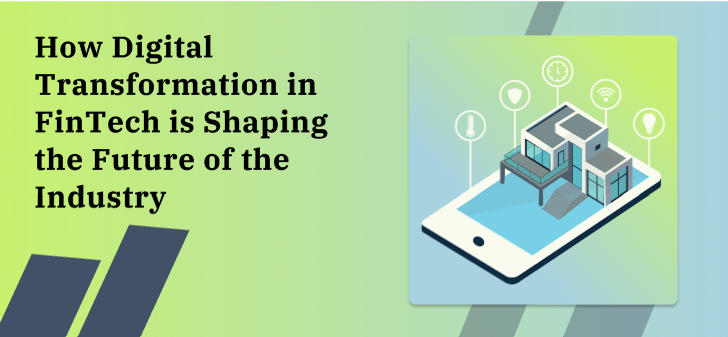The financial landscape is currently undergoing a dramatic transformation due to the advent of digital technology. Did you know that the global FinTech industry could reach $949.2 billion by 2030? This phenomenon goes far beyond banks implementing apps; instead, it marks an entirely different way we interact with money. FinTech digital transformation involves adopting innovative digital technologies, such as artificial intelligence, fintech blockchain, cloud computing, and big data, to alter how financial products and services are delivered fundamentally.
Removing digitization as the sole approach requires creating entirely new financial ecosystems focused on customer efficiency and effectiveness.
This transformation represents more than mere hype; it marks an irreversible, fundamental transformation that’s shaping the future of financial services and FinTech as we know them today. It democratizes access, ignites unprecedented innovation led by agile FinTech startups and compels traditional institutions to adapt quickly or face obsolescence.
In this blog post, we’ll look closely at what forces are fuelling change within finance today, discuss key technological pillars enabling this transformation, examine its effect on both emerging FinTech solutions and established banks, and speculate what future lies in store for finance itself.
Key Areas Where Digital Transformation is Reshaping FinTech
Payments
Digital transformation has revolutionized payments, moving us toward instantaneous and seamless transactions. Mobile wallets and contactless technologies have become ubiquitous for instant fund settlement. Real-time payment systems (RTPSs), open banking APIs, and embedded finance facilitate the integration of services, such as “Buy Now, Pay Later” (BNPL). Blockchain technology also plays an integral part in securing lower-fee cross-border payments, ultimately providing users with frictionless, fast, and safe experiences globally accessible experiences – this is FinTech digital payments rolled up into one.
Lending and Credit
Digital transformation has profoundly impacted the lending and credit industries, transitioning from slow, paper-heavy processes to agile, data-driven approaches. Artificial Intelligence (AI), machine learning (ML) online platforms, and neobanks utilize artificial intelligence and machine learning for rapid FinTech credit scoring.
This analysis involves vast datasets, including alternative data, to provide precise risk evaluation for personalized loan offerings, thereby fostering financial inclusion.
Neobanks streamline applications to near-instantaneous decisions, while Robotic Process Automation (RPA) increases efficiency and significantly decreases costs, resulting in greater accessibility and a faster lending experience for borrowers while also improving efficiency among lenders alike. The result: an accessible, faster lending experience for borrowers, while increased efficiency among lenders themselves leads to greater accessibility, speedier lending experiences overall, and reduced costs for lenders.
Wealth Management and Investment
Digital transformation has revolutionized wealth management and investing, making sophisticated financial advice accessible to a broader audience. Robo-advisors powered by artificial intelligence provide automated, algorithm-driven financial planning services at lower costs than their manual equivalent. Data analytics provide hyper-personalized strategies, as well as real-time market intelligence, while blockchain integration unlocks tokenized assets. FinTech wealth management seeks to adapt its platform with intuitive solutions for younger, tech-savvy investors, offering tailored advice at every level.
Banking and Retail Financial Services
Traditional banking is undergoing an unprecedented transformation, driven by customers’ increasing demands for convenience and personalization. FinTech mobile banking apps have emerged as the primary interface for managing accounts, payments, and transfers. Meanwhile, digital-only neobanks often provide superior experiences at lower fees. AI-powered chatbots offer 24/7 support, while digital onboarding processes eliminate physical paperwork completely, creating seamless “omnichannel” experiences that improve data security and streamline operations.
Cybersecurity and Fraud Prevention
As financial services become more digital, robust cybersecurity and fraud prevention become essential. Digital transformation allows institutions to effectively defend against sophisticated cyber attacks using cutting-edge tech solutions like artificial intelligence (AI). AI plays an integral part in real-time fraud detection. Multifactor authentication greatly diminishes account takeover attempts while behavioral biometrics provides additional layers of defense. Blockchain’s immutable ledger provides additional safeguards, guaranteeing transactions and data remain protected; and is at the forefront of an innovation race to protect customer transactions while upholding customer confidence in this sector of the innovation landscape.
The Future Landscape of FinTech
At present, we’re only seeing the beginnings of an even more vibrant financial future. Artificial Intelligence and Machine Learning should evolve exponentially to deliver unprecedented levels of automation and insight. Beyond simply personalization, they may even go further by offering solutions before customers even recognize they need help. Meanwhile, fraud detection systems will leverage cutting-edge AI techniques to detect threats in real time, making transactions safer than ever.
Blockchain and digital currencies will see wider acceptance over time, though regulatory frameworks remain fluid. Blockchain’s underlying technology offers enhanced transparency, security, and efficiency for cross-border payments, as well as asset tokenization processes. Central bank digital currencies (CBDCs) could become mainstream soon, radically shifting monetary policy and payment infrastructure globally and leading to truly interoperable global financial systems without geographical limitations or boundaries.
FinTech will soon become increasingly tailored, and proactive financial guidance will become the hallmark of its future success. Gone will be the days of one-size-fits-all products; AI and data analytics will enable financial institutions to offer customized services suited to individual lifestyles, risk appetites and long-term goals – providing advice such as saving for a significant life event in advance; optimizing investments based on real-time market shifts or alerts of possible investment opportunities all delivered smoothly and intuitively by financial services institutions.
A significant trend will be the growing adoption of “invisible” banking, also known as embedded finance. Financial services will become seamless components of our daily lives and digital platforms. For instance, when purchasing a car, it might include pre-approved loan offers at the point of sale, or smart refrigerators may order groceries while managing payments directly. Such integration makes financial interactions almost imperceptible, further blurring the boundaries between commerce and finance.
Additionally, FinTech companies will continue their focus on sustainability and ethical solutions as environmental, social and governance (ESG) concerns grow. FinTech solutions may emerge to assist both individuals and institutions in making more responsible financial choices, such as monitoring carbon emissions or tools focused on impact investing or ethical lending practices that prioritize social good alongside financial returns.
As technology becomes an integral component of finance, traditional finance will increasingly merge into it. Financial institutions will evolve into tech companies with banking licenses, while tech giants are offering increasingly complex financial services. This convergence will foster highly competitive yet innovative environments, resulting in more efficient, inclusive, and responsive ecosystems to serve today’s digitally native population.
Conclusion
Digital transformation represents more than an upgrade – it signifies an entire reinvention of FinTech industry. From reinventing how payments and credit access occur to expanding wealth management offerings and strengthening cybersecurity capabilities, technology is changing all areas of financial services delivery dramatically. This change is driven by changing customer expectations, rapid technological progress and an ever-evolving competitive environment – each pushing boundaries beyond what was ever thought achievable within financial services.
These changes promise immense advantages to consumers and institutions alike, offering individuals more convenient financial tools while businesses gain operational efficiencies, customer insights, and new revenue streams. Unfortunately, traditional institutions must contend with legacy systems which require upgrading while simultaneously complying with security requirements and regulatory compliance rules – this presents them with unique hurdles to navigate when updating and remaining innovative while meeting compliance regulations and security compliance rules.
As we step further into an age dominated by digital technologies, embracing its changes is no longer optional; it has become mandatory. Consumers seeking financial optimization and institutions aiming for competitive advantage alike have come face-to-face with digital realities; therefore, organizations searching for effective methods of digital transformation strategies require experienced technology partners that will unlock all their full potential while reaping successful rewards from them.
Echoinnovate IT stands ready to assist businesses in successfully deploying cutting-edge FinTech solutions that enable them to thrive in this dynamic sector and bring immense value to their customers.
How Digital Transformation in FinTech is Shaping the Future of the Industry
What does digital transformation mean in FinTech?
It refers to the integration of advanced technologies like AI, blockchain, and cloud computing to modernize financial services and improve customer experiences.
How is AI impacting the FinTech industry?
AI is enhancing fraud detection, automating customer support, and enabling personalized financial services, making operations faster and more efficient.
What role does blockchain play in FinTech transformation?
Blockchain ensures secure, transparent, and decentralized transactions, reducing fraud and increasing trust in financial systems.



